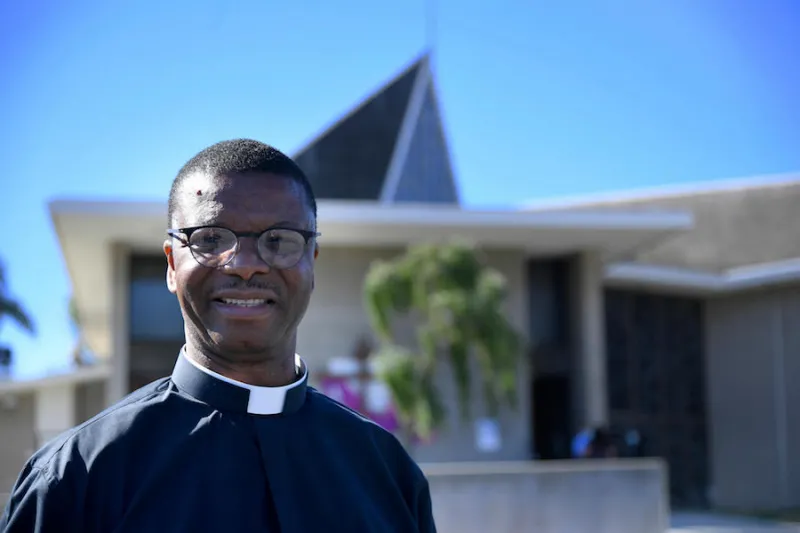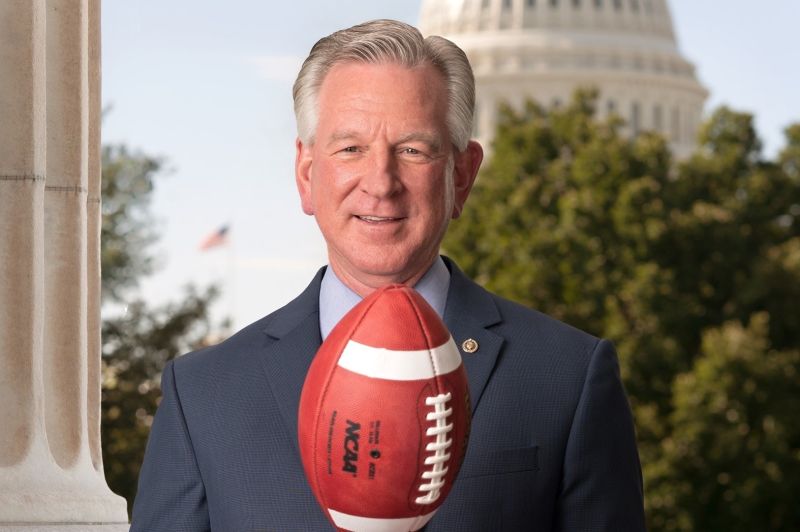
Los Angeles, Calif., Apr 22, 2021 / 17:00 pm (CNA).
Father Aloysius Ezoenyeka didn’t know how long he had been unconscious. A gentle slapping on his face stirred him, and his eyelids flicked open to an African hospital room filled with people clapping and cheering.
“Father, Happy New Year. Welcome to 2021.” Joy flooded the faces of the weary doctors, nurses, friends, and family who surrounded his bed.
The news of the new year wasn’t the only surprise awaiting his waking moments. The medical staff recounted everything that had happened to him over the past 24 hours, relaying the harrowing tale of the father-and-son rescue team that brought him to the hospital, the struggle to find a clinic that could perform life-saving surgeries, and more—a flurry of events that followed Father Al’s being shot by armed assailants while alone on Southwest Nigerian roads, just one night before.
The events of the previous night began with Father Al praying the rosary while he drove, contemplating what post-prayer music to put on for the rest of his long drive. Suddenly, he heard a sharp noise. Perhaps it was just a pebble propelled loudly from under his tire.
In the next split second, the origin of that sound was unmistakable. His windshield shattered as bullets passed by his side, fired by two men hiding in roadside bushes directly in front of him.
“I didn’t know what to do, but I didn’t have any time to be afraid,” he told CNA. He had traveled this road many times as a Benedictine of Ewu Monastery, and he had heard it was a dangerous stretch of land because of bandits. But he never expected that he would be on the receiving end of violent gunfire.
“I didn’t think there would be any problem at all for me. I knew that there could be robbers, but I never really thought seriously it would happen to me.”
Although unscathed after the first volley of bullets, he knew that the assailants’ intention was to kill him. “You might as well at least try a little bit to give them a run for their money,” thought Father Al.
In that desperate moment, he found himself faced with three options: he could take the lane further from the shooters, but that would allow more time for them to shoot at him. Or he could take the lane closer to the bush in which they hid, but that would just make his car a closer shot.
The third option was to drive towards his attackers. “That would scare them. Or, they would get me right away, and that would be the end of it.” Making a life-or-death decision, he pressed himself under the steering column, taking meager cover under the dashboard as he slammed on the gas pedal.
The assailants ran into the bush behind them to avoid his car and unleashed another barrage. Rounds lodged in the front tire and around the engine—and painfully into Father Al’s stomach.
“There’s no way you can have that amount of bullets without being hit. I’m just surprised I was only hit once. I didn’t stop… I held the wound as much as I could to keep the blood from flowing, but it was practically impossible to do that. I did that the best I could.”
As he later recounted the story, Father Al nonchalantly noted the irony of his situation, laughing: “Drive-bys are usually people inside the vehicle shooting at people or houses, but this drive-by was me driving by.”
He decided to stop for help once he was out of range and out of danger. As soon as he was clear, almost like clockwork, the engine died and he coasted off the road near a lonely truck stop with broken vehicles. He stepped out of his own mangled car, and then collapsed.
An 11-year-old boy named God-is-Great watched Father Al’s wounded body fall to the ground, unmoving. The boy ran to get his father, SonyMopo. Others came to help, too, but no one had medical training, there were no supplies, and not even a 9-1-1 number to call. While SonyMopo went to get his own vehicle, nothing could be done for Father Al.
“There’s no emergency line. They were confused. What’s truly sad is that you couldn’t do anything for another human being that is in need. Just thinking about it is really strange. I could feel that they wanted to help, but didn’t know what to do,” the priest said.
He lay bleeding on the ground for over an hour. Eventually, SonyMopo came speeding along, coming to a rolling stop next to the crowd surrounding Father Al’s wounded form. They loaded him into the back of the vehicle to take him to the local clinic.
The only path they could take was blocked by the same shooters. Unknown to Father Al, SonyMopo had grabbed a gun. He told his son to drive the car while he shot out of the lowered passenger-side window to scare off the assailants so they could pass safely.
“At that point, I was in pain, just trying to pray,” Father Al said.
A young man named Chidiebere sat in the back with Father Al and prayed Hail Marys in their familiar, shared language. They were both from the same tribe, just one village over from each other. Interspersed in these prayers were appeals for Father Al to pray out loud and to not close his eyes.
“Any time I would try to give up, he would say, ‘No, no, no, Father, you’ll make it.’”
Together, they arrived at the first clinic, Okada Teaching Hospital, at 6 p.m. and stayed there for about two hours. But they had no supplies at the clinic.
The hospital staff murmured at Father Al’s volatile condition. “Don’t worry about that man—he’s not going to make it. He’s going to die anyways, so just look at other ones,” he remembered hearing.
Chidiebere, SonyMopo, and God-is-Great continued to encourage him to stay awake as they sped for more than 90 minutes to their next option for care: the emergency room at Benin, to which they arrived at around 10 p.m. Multiple times, they were delayed by policemen who pulled them over for speeding.
“A lot of things go through your mind. You say a lot of prayers,” Father Al said. “Apart from saying those prayers, you have to make peace with the fact that this is the end. And I did. The beginning hours were praying for God to help me and all that, but by the time we got to the hospital in Benin, I had already made my peace. I could not believe that I was going to make it, and I was okay with that. I prayed to God.”
When the medical team found that he was a priest, they called everyone they could think of and worked to get a team of doctors to leave their families to prepare for surgery on New Year’s Eve.
At this point, Father Al assumed he was going to die. He had lost a lot of blood, and the doctors had said it was too late for him.
The priest’s brother Titus drove the three hours from their village to the hospital and collected Father Al’s things from SonyMopo.
“Listen. I love you, take care of everyone else. I will see you again,” Father Al told Titus before being ushered into surgery right around midnight, New Year’s Day.
A violent attack from gunmen and a five-hour surgery were certainly not part of Father Al’s plans. As a priest serving in California, he was in Nigeria just on a visit to family.
Father Augustine Ebido called Father Al’s American physician, Kevin White. Dr. White attempted to get through to Father Al’s regional bishop, Auxiliary Bishop Robert Barron of Los Angeles, to inform him of the priest’s condition.
But through all the chaos and a literal game of telephone, incorrect information was shared throughout the staff and diocese. “Some people were thinking I was going to die, that I didn’t make it, that people died in the car with me… it was just a lot of mixed up messages,” Fr. Al said.
Bishop Barron traveled to Father Al’s parish, Sacred Heart Catholic Church, to give the unfortunate news of his shooting.
“We heard that he had been shot many times and was left on the side of the road,” Bishop Barron told the Angelus. “When I first got the news, it was that he was dying. We had very little hope.”
Unsure of his condition, Father Al’s parishioners started a 3-day Novena, and the parking lot filled with cars to pray. They sent donations and more than 400 pounds of gifts for him and the people in Nigeria.
A few days later, Father Al was able to call Bishop Barron directly and give him the news of the successful surgery.
“He was very weak. I could barely understand him. But he was conscious, and he knew who I was,” Bishop Barron told the Angelus.
Bishop Barron called often to check on his recovery and to offer help, encouraging Father Al to return to America to receive medical attention.
Father Al insisted he did not want to go anywhere until he had healed, so the bishop told him, “Whatever you need, let us know and we’ll provide it for you.”
Although appreciative of the many offers he received to be transported to America, Fr. Al said he chose to remain in Nigeria with his family to help show people in the United States that despite the troubles Nigeria faces, it is filled with good people.
The priest said he is saddened by the media portrayal of Nigeria, which tends to focus on negative events but not positive aspects of the country. Father Al said he is proud of his country and grateful for the care he received, feeling God worked through the doctors and nurses there.
“There’s no way you can survive six, seven hours without medication with losing so much blood,” he said. “That was almost an impossibility. They said at that clinic there was no way else I was going to survive. The doctors at the hospital said it was not going to work. I think it was purely providential.”
Father Al eventually healed and did return to the United States, where 600 people attended a “Miracle In Nigeria Thanksgiving Mass & Celebration” that Bishop Barron concelebrated with Fr. Al on Palm Sunday this year at Sacred Heart Catholic Church.
Today, Fr. Al has almost entirely recovered.
“I don’t have much pain anymore. I ran four miles this morning. I guess if I can run four miles, I’ve recovered,” he laughed.
Fr. Al remains grateful for the experience, saying it has brought him closer to God and changed his views on life.
“This is the way I read my own life: God prevented my death because he believed I was not ready,” he said. “I was not ready for eternity. I was not ready for Heaven. I needed more work for sanctification. I needed to be alive for him to sanctify me and purify me and help me to be ready.”
If you value the news and views Catholic World Report provides, please consider donating to support our efforts. Your contribution will help us continue to make CWR available to all readers worldwide for free, without a subscription. Thank you for your generosity!
Click here for more information on donating to CWR. Click here to sign up for our newsletter.







Leave a Reply